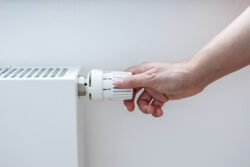Is turning off radiators a smart move to save energy? (Picture: Getty Images/EyeEm)
As the cost of living continues to increase, many members of the public are looking to cut down on their energy use in a bid to keep bills down.
Indeed, in the Autumn Statement by Jeremy Hunt to the House of Commons, it was revealed that the Energy Price cap is set to change again.
Liz Truss’ administration initially set a figure of £2,500 for what energy companies can charge per unit for two years.
However, the Chancellor confirmed the energy price cap will rise to £3,000 for an average-use household from April 2023, saying, ‘From April, we will continue the Energy Price Guarantee for a further 12 months at a higher level of £3,000 per year for the average household.’
With this in mind, many of us will be looking for hacks and tips on how to save on our energy bills – but it’s essential to sort the genuine information from the urban myths, as well as considering the safety of your household.
Energy Saving Expert with Quotezone.co.uk, Jack Ferguson, says, ‘When reviewing home energy usage, we recommend you ask yourself some simple questions; firstly, do I really need to use it? Or is there a cheaper way?’
To view this video please enable JavaScript, and consider upgrading to a web
browser that
supports HTML5
video
‘Remember – if it moves, lights up, or creates heat then it uses energy. Secondly, is the energy saving tip safe? Letting heat from the oven into the home could be dangerous if you have young kids and pets running around – always think safety first.’
When it comes to your central heating, it’s essential to make smart choices, so should you be looking to turn your radiators off in empty rooms save energy?
Here’s what you need to know.
Should you turn off radiators in rooms you do not use?
While it might be tempting only to heat the room you’re in, it can be bad for your health to confine the warmth to wherever you are spending your time.
Quotezone.co.uk put together a top 10 list of energy-saving simple queries and urban legends to help households discover savings.
Not heating rooms in your house can lead to damp. (Picture:Yui Mok/PA Wire)
As part of their advice, they state: ‘If you have Thermostatic Radiator Values (TRV) – the valves with numbers on them – then it is better to keep them on a low setting than completely turning them off, otherwise you can encounter other issues such as damp which can lead to health problems.’
‘The number two setting on a TRV is usually around 15 degrees C – too low for most people to feel comfortable but should be enough to keep those unused areas damp free.’
‘Avoid turning these above four as that is about 23 degrees C which will cost more to run and is too high for most people anyway.’
So it turns out it might be best to keep a degree (pun intended) of heat in any spare rooms you aren’t using after all.
MORE : Energy firms to face windfall tax as part of package to raise £14,000,000,000
MORE : What energy bills help is available amid the cost of living crisis?
MORE : Energy costs push UK inflation to highest level in 41 years
Follow Metro across our social channels, on Facebook, Twitter and Instagram
Share your views in the comments below
Will turning off your radiators help? Here’s what you need to know.





